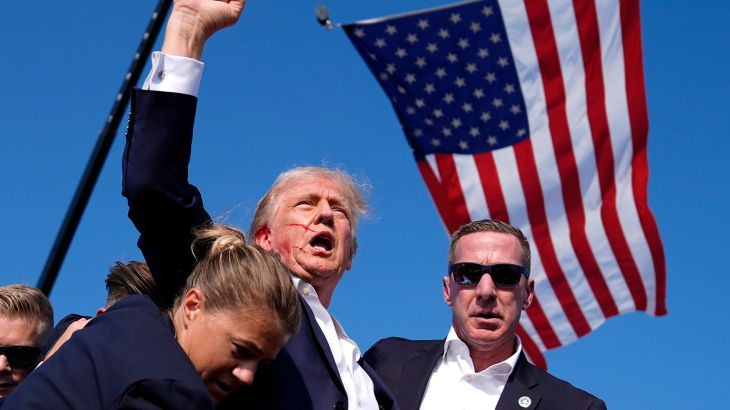Former President Donald Trump, well-known for his scrutiny of media bias, recently voiced concerns regarding the proposed ABC News debate with Vice President Kamala Harris, scheduled on September 10th. The former President observed that the network often conveyed an unfavorable attitude toward Republicans. His sentiments sparked during an informal discussion at a Vietnamese restaurant in Falls Church, Virginia. While watching ABC’s ‘This Week’, Trump was displeased by what he perceived as unfair treatment meted out to Sen. Tom Cotton, a Republican from Arkansas.
Trump’s dissatisfaction led him to question the need for the debate on ABC, and instead suggested possible collaborations with other networks. Challenging the partisan media environment, Trump demonstrated his readiness to participate in a debate. But he emphasized his aspiration to do it on an alternative network. Such a stance shows his intent to ensure fair representation and treatment for Republicans.
Trump’s conflicting and provocative remarks continued when he responded to a query about his participation in the debate. He raised doubts about the fairness of changes to the debate’s rules, without which he insinuated that he might reconsider his participation. Trump also took a swipe at his opponent, Vice President Harris, accusing her of being unable to articulate her stances sufficiently.
Trump was not shy about voicing his expectations for a ‘fair debate’ and his openness to face ‘tough questions.’ However, he was quick to call out ABC, suggesting that the network should be disqualified from hosting the debate. An attempt to undermine the credibility of a network believed to exhibit an anti-Republican bias was apparent. But, Trump did not fail to acknowledge those networks he saw as more impartial, including surprisingly, CNN, who he felt had treated the Republicans fairly previously.
Trump voiced his indifference towards the live microphones during the debate, stating that he did not mind whether they were on or off. Yet he indicated a preference for keeping the rules the same as last time. His moot point on muting the microphones seemed to be indicative of his belief in fair play and sticking to the rules.
The communication director for the Harris campaign, Michael Tyler, expressed that the campaign leaned towards having live microphones. He argued that it would serve to present both candidates as they truly are, with unmodulated voices. However contradictory this might appear, Tyler also added that Trump wouldn’t disagree with this stance, as he too favored live microphones.
Stalemate reigned in the debate rules negotiation between the two camps, primarily over the issue of whether the candidates’ microphones would remain switched on throughout. Harris’s team requested that both candidates’ microphones remain live throughout the debate, a slightly odd move that could potentially disrupt the intended structure of the debate.
The spokesperson for the Harris campaign, Brian Fallon, drew mistrust towards the former President’s camp. He alleged that Trump’s team preferred to have the microphones muted when the opponent was speaking because of doubts about their candidate’s presidential behavior. Contradictory to these claims, Fallon professed that Vice President Harris was prepared to tackle Trump’s incessant falsehoods and interruptions readily.
In another twist, Trump’s spokesperson, Jason Miller, stated that both parties had already agreed upon the debate rules, which would mirror the last CNN debate format between Trump and President Joe Biden. Moreover, Miller criticized the Harris campaign for overprotective behavior, insinuating that they were not confident in her abilities to articulate sound, repeated messages without aid like notes.
There was a dispute over the debate format, with the Harris campaign requesting a seated arrangement that permitted notes. A coy jab from Miller suggested that Harris might not be capable enough to articulate her campaign’s messages, painting that team as over-cautious. Clearly, they were resorting to tactics to mask the evident inadequacy.
Trump revealed his reluctance to participate in the ABC debate after Biden withdrew his candidacy, with Harris stepping forward to run for the Presidency. Surprisingly, he suggested shifting the debate to Fox News. Later, Trump conveyed his wish to confront Harris in not one but three separate debates in September. Plans are yet to be confirmed other than the slated ABC debate.
For the first time since the Commission on President Debates was formed in 1987, the organization has not sponsored the presidential debates in this election cycle. This unusual turn of events occurred after the Republican National Committee in 2022 withdrew from debates moderated by the commission. They instead required Republican presidential candidates to commit solely to debates approved by the Republican Party.
The Biden campaign also distanced itself from the commission-sponsored debates. Providing a view from the other side of the aisle, Biden campaign co-chair Jen O’Malley Dillon expressed concerns over the fall debates’ scheduling. She also accused the commission of its inability or unwillingness to enforce the 2020 debates rules, alluding to a widespread dissatisfaction with the debate commission’s performance and impartiality.
Overall, the arguments, negotiations, and insinuations around the upcoming presidential debate serve to highlight the tensions that exist in this current political climate. The continuing critique of partisan media bias, the questioning of debate rules, and personal attacks reflect the polarizing views clashing in the lead-up to the showdown between Trump and Harris on September 10th. One can only anticipate what the actual debate might reveal.


